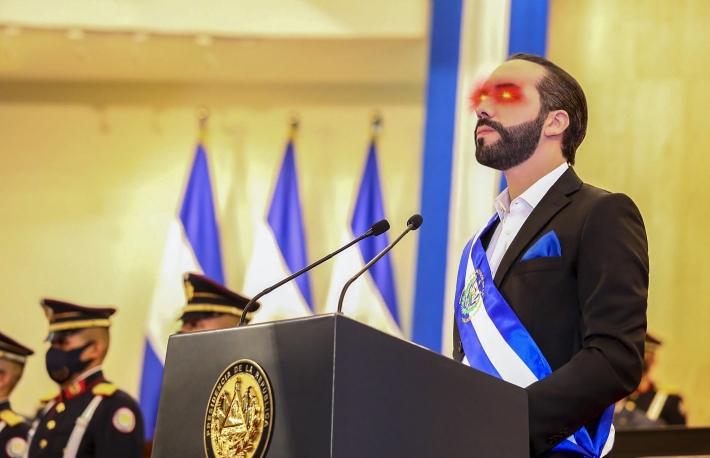“This is very good because bitcoin is decentralized and nobody has control of bitcoin and the dollar is in the hands of the governments,” Valle said in Spanish.
But not everyone shares his enthusiasm. Among six locals interviewed by CoinDesk, from the capital of San Salvador and beyond, the mood ran from elation for the move to suspicion of Bukele’s motives. Bukele’s government has a reputation for corruption, leading some to wonder if bitcoin will end up just enriching and strengthening a government that shows authoritarian tendencies.
On Saturday, Bukele announced that he will submit a bill to make bitcoin a legal tender to parliament this week, though he said in a tweet Monday that the bill had not been made final yet. If passed, the bill would put El Salvador on the path to becoming the first nation in the world to adopt bitcoin as an official currency.
On Monday, Secretary of Commerce Miguel Kattán said that although bitcoin would be integrated into the local economy, its use wouldn’t be mandatory and it wouldn’t replace the U.S. dollar.
Bukele’s announcement was met with great enthusiasm from the international crypto community, with bitcoin proponents such as MicroStrategy CEO Michael Saylor showing support and TRON (TRX, +3.08%) founder Justin Sun tweeting that his organization would be the first to “establish an office” in El Salvador.
Bukele – a populist whose New Ideas party won the legislative elections in February in a landslide – has strong support in El Salvador, and so the bitcoin bill will likely pass without much opposition. But some Salvadorans are concerned that Bukele has other motives for the legalization of bitcoin.
“In my personal view, without a doubt, [this] has something to do with possible sanctions that the U.S. might impose on [Bukele] and many of his associates,” said Isaac, 27, a student at Universidad de El Salvador and crypto investor who asked to withhold his full identity so that he could speak freely.
Since Bukele, 39, took office in 2019, U.S. allegations of corruption against his administration have been mounting and El Salvador’s economy has suffered during the pandemic. But Bukele’s move to legalize bitcoin may distract the world from the country’s struggles.
Corruption
In 2019, Bukele won the presidential election in a landslide on an anti-corruption platform with the slogan “There’s enough money when no one steals.”
But as the country went under pandemic lockdown in 2020, a string of investigations by local journalists looked into the government’s alleged corruption in the management of public resources and with the administration’s response to the COVID-19 pandemic.
Allegations of corruption have resurfaced after Bukele fired El Salvador’s attorney general and five supreme court justices last month, following clashes over the constitutionality of his lockdown orders. Shortly after the dismissals, Bukele addressed the world in a tweet: “We are cleaning our house… and that’s none of your business.”
Three weeks ago, five Salvadoran officials with ties to Bukele were named in a U.S. State Department list of senior government officials from Central America credibly alleged to have committed or facilitated corruption. Meanwhile, the outgoing attorney general was promptly replaced with Rodolfo Delgado, an ally of Bukele’s who has announced that El Salvador will be exiting its anti-corruption accord with the Organization of American States (OAS). The accord is part of an initiative to mitigate corruption in the region, which the U.S. sees as “one of the root causes of undocumented immigration,” according to Reuters.
Since announcing the new bill, Bukele has been busy re-tweeting messages of support from the crypto community, including a Forbes article that said “El Salvador could become one of the most significant monetary centers in the world” if Bukele’s bill is passed.
“[Bukele] wants to distract the press from the chaos,” said Roberto Pineda, a Salvadoran chef and entrepreneur.
Chaos
On June 4, the day before Bukele announced the bitcoin bill, Ernesto Muyshondt, a former mayor of San Salvador and adviser to the OAS, was arrested on multiple charges (though the specific charges were changed by local officials multiple times), one of which came directly from the attorney general’s office, according to local reports.
The national civil police (PNC) charged Muyshondt with improper appropriations of tax withholdings, and he is already under investigation for negotiating with gangs.
“Today, I’m a political prisoner,” Muyshondt tweeted on June 4.
Meanwhile, the country is in deep economic trouble. This year’s budget, which passed congress and was ratified by Bukele in January, showed a substantial deficit amid “limited financing options” according to Fitch Ratings.
Between March 2020 and March 2021, the country lost 36.6% of its net international reserves (RIN) or U.S. dollar reserves, while neighboring countries Guatemala and Honduras boosted their reserves, according to a report by El Economista.
“It is from April 2020 that the decrease begins to be seen and shows the use of the resources of the reserves that the Salvadoran government has been making to meet the expenses of the emergency,” the report said.
Foreign currency reserves can be depleted as governments make withdrawals without enough money coming in through direct investments or remittances to replenish them.
Meanwhile, the country’s national debt as a percentage of its gross domestic product amounted to almost 71% in 2019, and the total central government debt rose 15.9% in the first quarter of 2021, compared with the same period in 2020.
“The real truth is that [Bukele] has no place where to get more money to run the country,” Pineda, the chef and entrepreneur, said.
But Valle, the bitcoin investor who claims to have 90% of his savings in the cryptocurrency, says Bukele has worked to make El Salvador better and the legalization of bitcoin will help the country’s ailing economy.
“He has been president for two years, and he has been working for the Salvadoran people since he has been in office. He has helped and is helping to improve El Salvador,” Valle said, adding that Bukele has done more than previous presidents who didn’t support tourism or create employment opportunities.
Crypto
With the economic and political chaos, there’s a strong case for the use of bitcoin. El Salvador has some of the characteristics that have made bitcoin appealing to large crypto emerging markets like Nigeria and Venezuela, such as a large unbanked population and lots of migrant workers. In Nigeria, for instance, bitcoin is used to process remittances cheaply and quickly, while providing a way for people without the means of opening bank accounts to access financial services with a cellphone.
According to the World Bank’s 2017 index on financial inclusion, only 30% of adults in El Salvador had access to a local bank account, compared with 45% in neighboring Honduras. Meanwhile, roughly one-fifth of the nation’s GDP comes from remittances from immigrants living abroad. In 2020, even with the pandemic, El Salvador received a record $5.92 billion in remittances.
For the more than one million Salvadoran immigrants in the U.S. who sent remittances back home to their families, bitcoin can be a game changer, said Carlos Miguel Rivas Carrillo, a lawyer and founding board member of a fintech association in San Salvador.
“That part is going to be a huge improvement because they’re going to pay lower fees, and they’re not going to use Western Union or MoneyGram,” Carrillo said.
But Carrillo is cautious about the announcement of a bill he has yet to see and about the technical feasibility of a bitcoin economy.
Caution
Although Carrillo is thrilled that legalization might prompt merchants to start accepting bitcoin as payment, he doesn’t believe that all savings and loans will be in bitcoin or that government workers will be paid in cryptocurrency.
“There’s so much volatility in bitcoin so that’s insane,” Carrillo said.
Carrillo is also concerned about the degree to which bitcoin will be accessible to the public.
“We have a big challenge as a country because we don’t have all the requirements to make this technologically feasible for everybody,” Carrillo said.
For instance, although there are just over 6 million people in the country, there are about 9.5 million mobile connections. But only about 34% of the population has access to the internet, and only a small minority use new technology, according to Isaac.
“Many – and I mean many – are afraid to use a laptop or have problems using their smartphones. So if one of the first things to do when you enter the world of crypto is to become very savvy about it, how on earth is that going to happen here on a big scale?” Isaac said.
Isaac is also concerned about the crypto community’s enthusiasm surrounding Bukele and El Salvador. For instance, some crypto influencers and firms have been tweeting about moving to El Salvador, tagging luxurious villas and beaches, along with Bukele himself.
“My objections to this is, why do all these crypto enthusiasts have so much hype for this guy? Aren’t crypto people against Big Government, big regulations, taxation? It seems that they don’t have a problem with a wannabe tyrant as long as he supports crypto,” Isaac said.
But Valle and Carrillo are hopeful that making bitcoin a legal tender will spark a new beginning for the country and economy.
“From a vision in the future of the Salvadoran economy, he knows that by accepting bitcoin, he is anticipating and preparing for a new monetary system,” Valle said of Bukele’s decision to adopt bitcoin.
Despite the reports of corruption, Carrillo believes bitcoin could be an opportunity for Bukele to change the narrative and change the future of El Salvador.
“I think this is our right moment to make a turn,” Carrillo said.





